What is Opioid Detox Like in Charlotte, North Carolina?
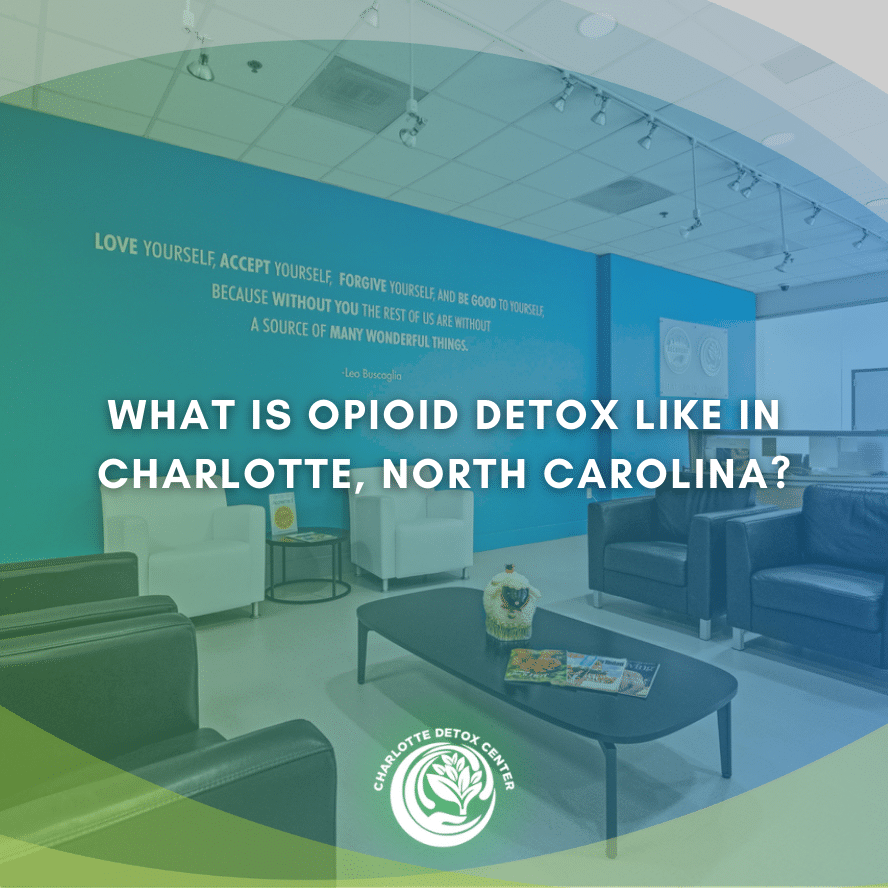
Medically Verified: 2/1/24
Medical Reviewer
Chief Editor

All of the information on this page has been reviewed and verified by a certified addiction professional.
Opioids, also known as prescription opiate painkillers, include a number of different medications that are prescribed to help manage moderate to severe pain. Some of these medications include codeine, morphine, hydromorphone, and oxycodone. Between 21-29% of people who are prescribed opioids for chronic pain misuse them, and between 8-12% of people who use opioids develop an opioid use disorder.[1]
Opioid use disorder (OUD) develops after a person develops a physical and/or psychological dependence on opioids. Unfortunately, physical dependence on opioids can develop in as little as one week. Individuals who quit taking opioid medications cold turkey experience various withdrawal symptoms as the body adjusts to functioning without an opioid in the system.
Opioid withdrawal symptoms occur when people who are addicted to opioids stop using the drug or significantly reduce the amount of the drug they are addicted to. The severity of a person’s symptoms and how long they last depend on how long they have been using opioids and the severity of their addiction.
Although opioid withdrawal syndrome is typically not life-threatening, symptoms can cause serious distress and discomfort to the person struggling. And, due to the intensity of symptoms, many people find it tremendously difficult to stay sober and endure the entire opioid withdrawal timeline. Fortunately, opioid detox centers in Charlotte, North Carolina provide pharmacological and holistic support to help individuals complete detox safely and comfortably.
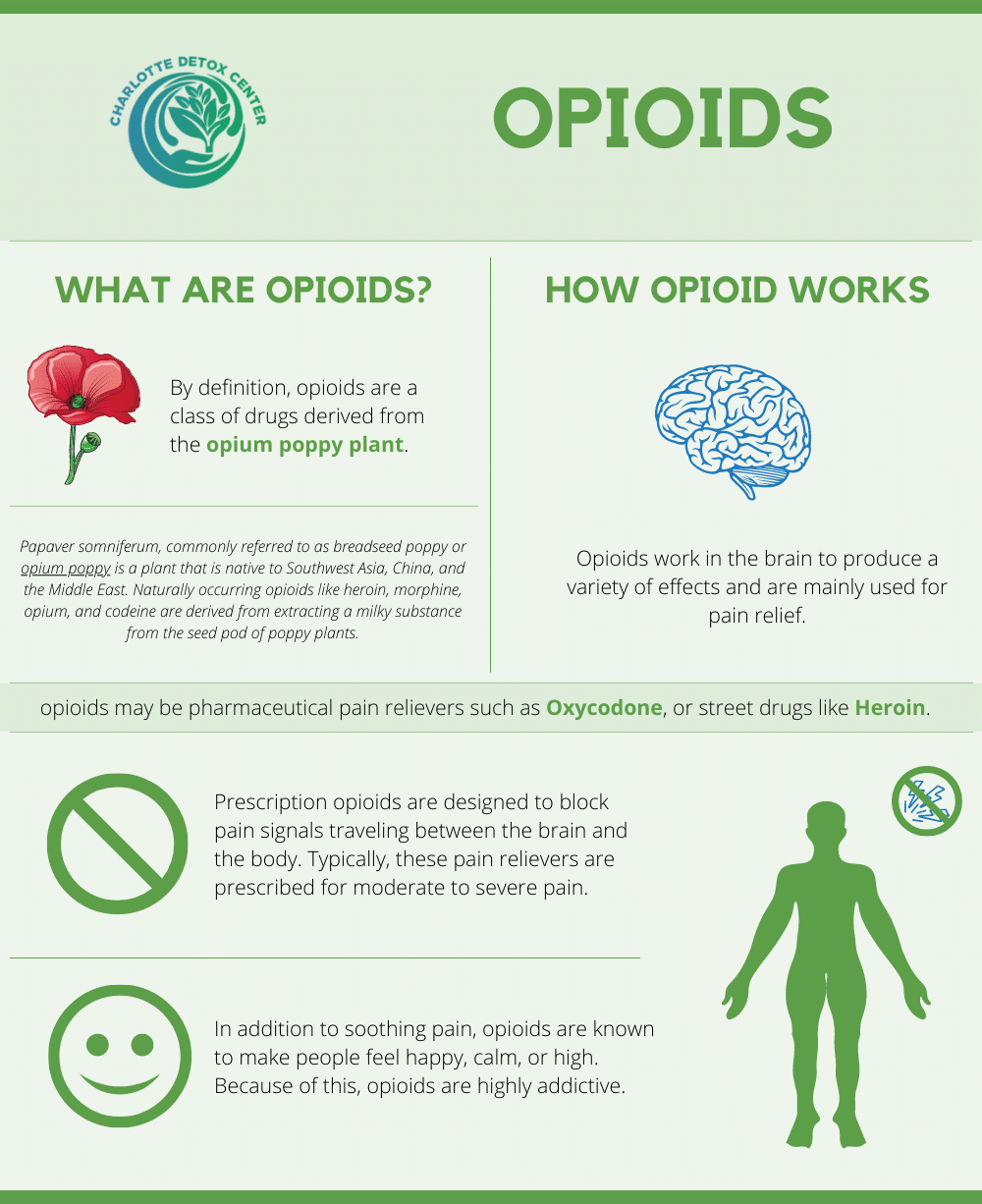
What to Expect During Opioid Detox in Charlotte, North Carolina
Since the risk of relapse is so high during opioid withdrawal, it is always best to detox in a medical facility. Medical opioid detox programs provide individuals with a safe and structured environment that helps guide them through the withdrawal process. Doctors evaluate patients, prescribe detox medications, and develop an individualized treatment program for each person.
Individualized Care
No two individuals have the exact same medical treatment needs. That’s why opioid detox programs in Charlotte, North Carolina begin with a comprehensive intake evaluation. Patients meet with medical staff so the team can learn about the patient’s opioid abuse, current symptoms, medical history, and family history. This information helps staff develop a treatment plan that is custom-tailored to meet each person’s needs–from the medications prescribed to the therapies offered.
Opioid Withdrawal Symptoms
Opioid withdrawal symptoms can range from mild to severe depending on the severity and length of a person’s addiction. The longer a person has been addicted, the worse their symptoms may become. Other factors like underlying mental or behavioral conditions, use of other drugs, and overall health can also influence opioid withdrawal.[2]
Within the first day after consuming the last dose, a person may begin experiencing any or all of the following withdrawal symptoms:
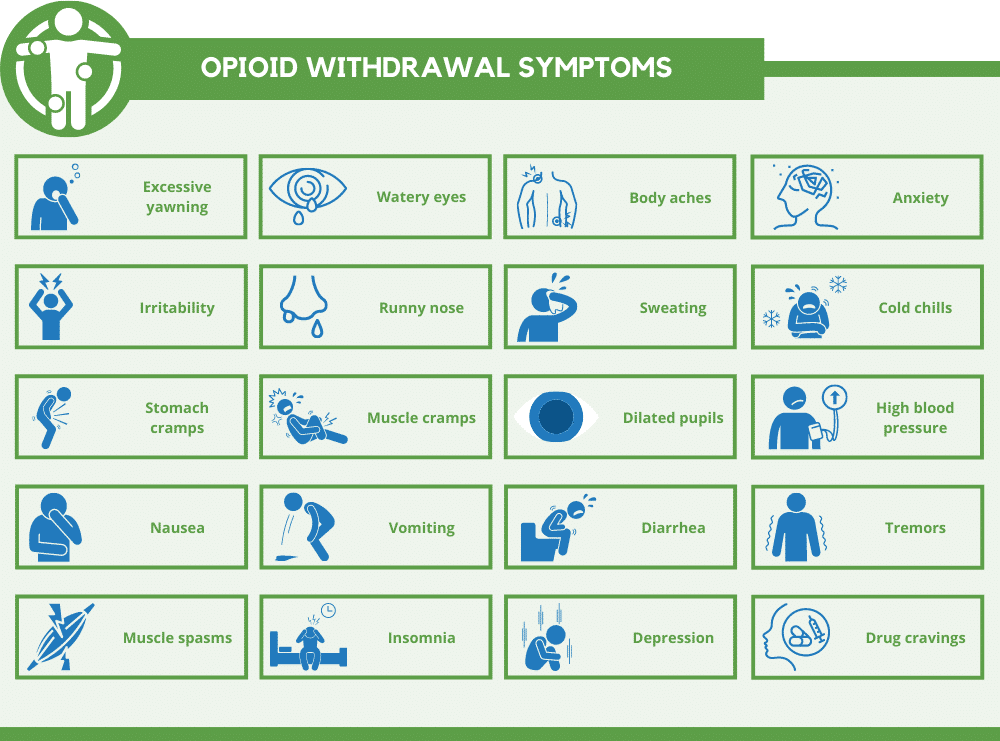
- Excessive yawning
- Watery eyes
- Body aches
- Anxiety
- Irritability
- Runny nose
- Sweating
- Cold chills
- Stomach aches
- Muscle cramps
- Dilated pupils
- High blood pressure
- Nausea
- Vomiting
- Diarrhea
- Tremors
- Muscle spasms
- Insomnia
- Depression
- Drug cravings
These flu-like symptoms can be extremely uncomfortable, but certain FDA-approved medications can help treat opioid withdrawal and manage cravings.
Medically-Assisted Detox and Stabilization
Medical drug detox programs in Charlotte, North Carolina use medications to help patients throughout the opioid withdrawal process. These medications help reduce the severity of withdrawal symptoms and treat long-term issues related to opioid abuse. Some of the most commonly used medications during opioid detox include:[2]
- Buprenorphine (Subutex or Suboxone) – An FDA-approved medication that is a partial opioid agonist. Partial agonists bind to opioid receptors in the brain without producing a “high.” This helps reduce the severity of withdrawal symptoms by weaning individuals off of stronger opioids by using a weaker one.
- Methadone – Another FDA-approved medication that is an opioid itself. Most detox facilities have replaced methadone use with buprenorphine, but it may still be used depending on a patient’s specific needs. Each day, a patient’s methadone dose is reduced to wean them off of opioids.
- Clonidine – An antihypertensive that is used to treat high blood pressure. It can help alleviate symptoms like anxiety, stress, rapid heart rate, and high blood pressure.
Doctors and nurses may also provide supplements and vitamins to help boost the immune response and speed up withdrawal.
Throughout the detox process, nurses and other staff members monitor patients. All patients have their vitals checked on a regular basis and have access to all the medical services they could possibly need. In the event of a medical emergency, the staff is always ready to intervene.
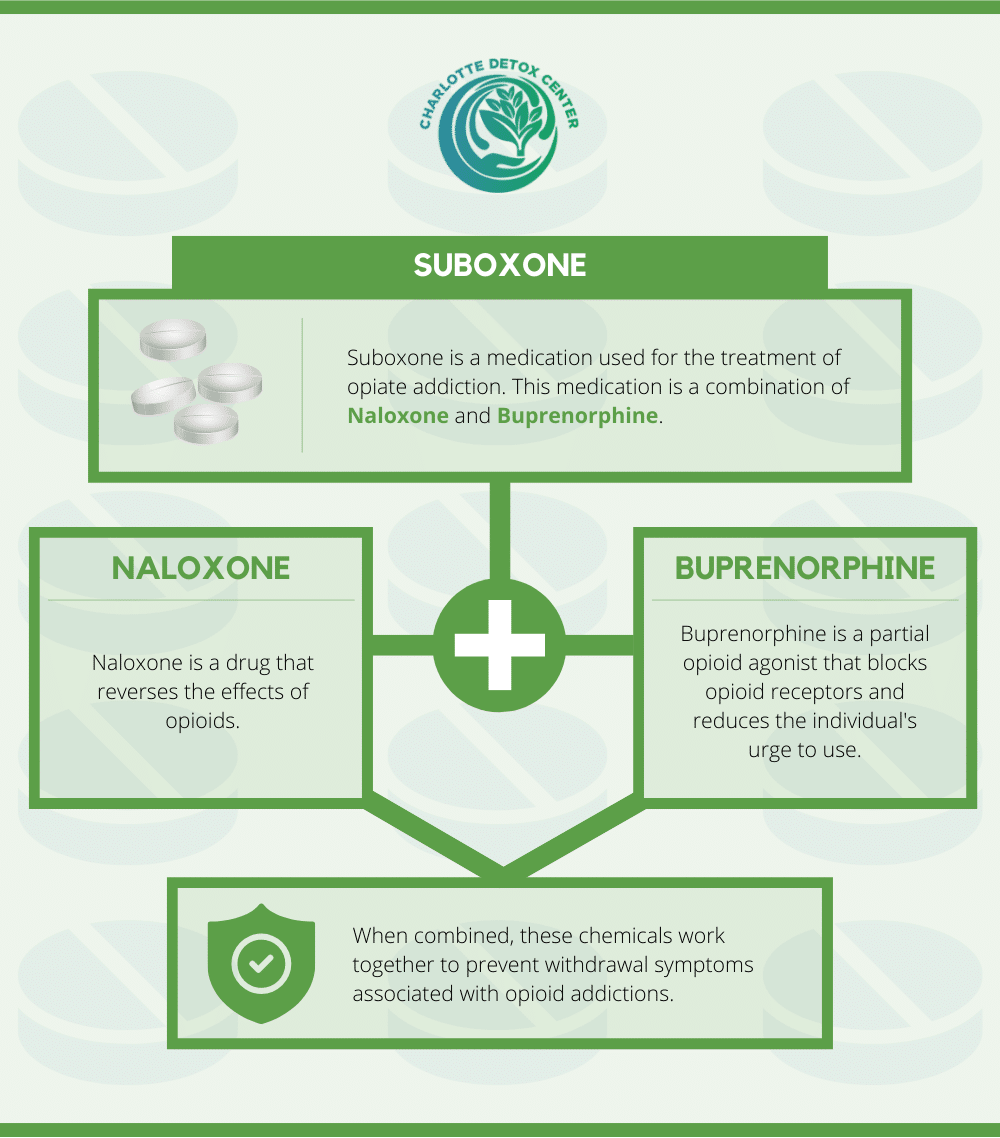
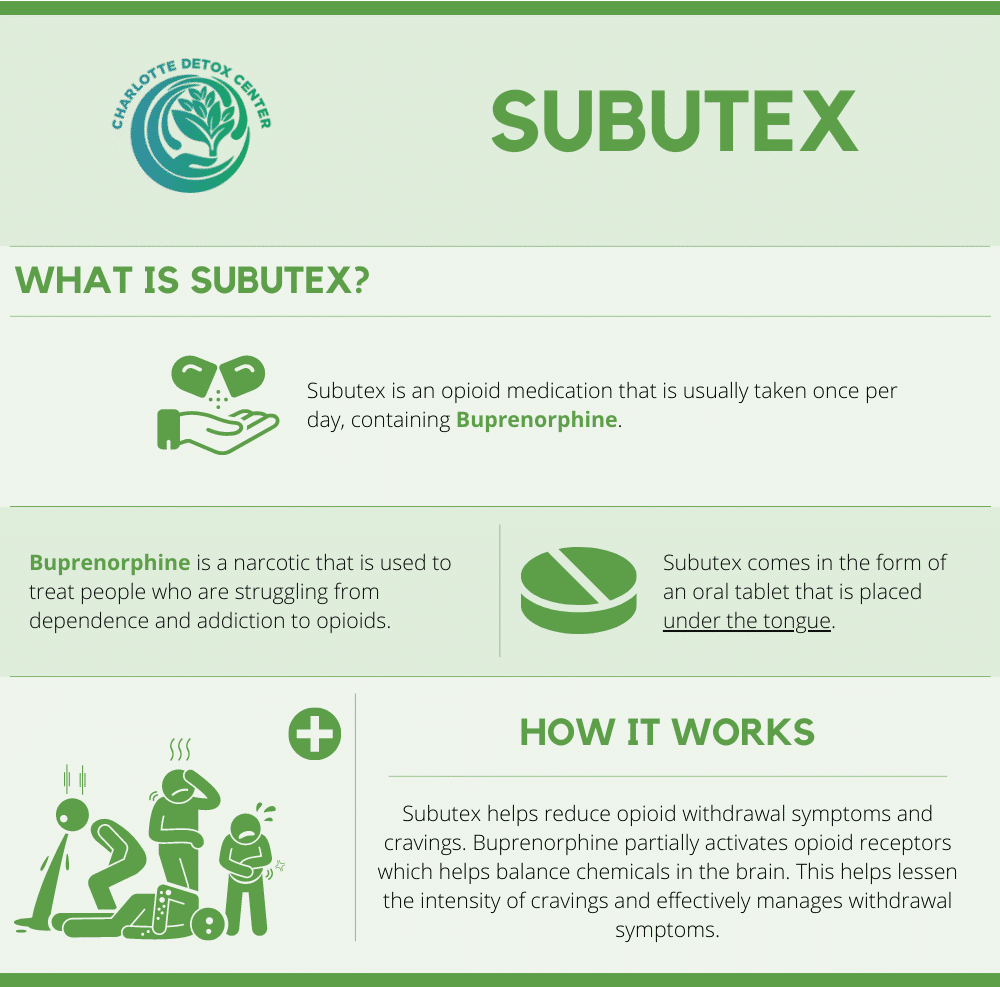
Support Groups and Activities
Medications can go a long way when it comes to treating opioid withdrawal, however, opioid detox centers in Charlotte, North Carolina provide additional services, as well. Various types of support groups, counseling sessions, and activities may be available to provide further support, such as:
- 12-Step meetings
- Holistic therapies like massage, chiropractic, yoga, meditation, acupuncture, art, music, or dance
- Psychoeducational group sessions
- Movies, games, books, and other activities to keep busy and distract from cravings
Rehab Planning
Opioid addiction is as much psychological as it is physical. In fact, most people who struggle with addiction also face some type of internal struggle, whether it be a mental health condition, childhood trauma, or a family history of substance abuse. While detox addresses the physical aspect of addiction by helping the body heal, drug rehab programs address the rest and teach patients how to live sober lives. That’s why detox is only the first step in the recovery process.
Before patients are discharged from a detox program, they will work with a substance abuse counselor to determine which treatment program is right for them. A counselor will verify their insurance and make arrangements for the transition to the treatment facility.
Find an Opioid Detox Center in Charlotte, North Carolina Today
Here at Charlotte Detox Center, we aim to bridge the gap between the luxury and comfort of your own home with the safety and medical supervision of a hospital setting. Our exclusive, private opioid detox facility in Charlotte, North Carolina is a great place for you to begin your recovery journey. Our highly trained and devoted medical staff will help you manage your symptoms and provide you with unconditional emotional support.
Don’t let opioid addiction run your life any longer. Give us a call today to get started.
References:
